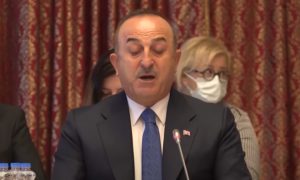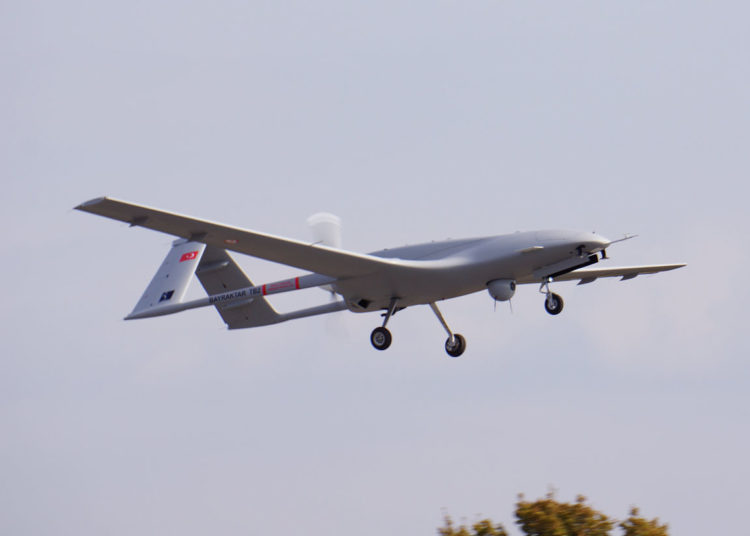Abdullah Bozkurt/Stockholm
Turkish Foreign Minister Mevlüt Çavuşoğlu justified the sale of armed drones to Ukraine as a response to Russian weapons found among hostile groups fighting against Turkey.
Answering questions from lawmakers in the parliamentary Planning and Budget Committee on November 4, 2021, Çavuşoğlu said Turkey encounters Russian-made arms in its fight against hostile groups in various places and defended the sale of drones to Ukraine.
“We say that after a country buys it [a drone], it can use it however it wants. It can also be bought from another country. We also come across Russian weapons in various places. I destroy them, I destroy or seize them when I come across them,” he said.
Çavuşoğlu was referring to Russian arms found in the hands of anti-Turkey groups ranging from the Kurdistan Workers’ Party (PKK) to the Libyan National Army (LNA) and Armenian militia in Nagorno-Karabakh.
The minister added that Turkey is not afraid of Russia and said his government did not have to explain itself to Russian officials on the sale of armed drones to Ukraine.
Minutes of the parliamentary committee hearing indicate that the Turkish foreign minister defended an armed drone sale to Ukraine while accusing Russia of arming anti-Turkish groups:
The Turkish government sold armed drones manufactured by a company owned and operated by President Recep Tayyip Erdoğan’s son-in-law Selçuk Bayraktar, who has grown his business using the influence and support of his father-in-law. Erdoğan actively promotes Bayraktar’s business interests abroad, securing deals for armed and unarmed drones with multiple countries.
The Kremlin has repeatedly warned Turkey that Turkish-made drones could further escalate the conflict in Ukraine.
Kremlin spokesman Dmitry Peskov was commenting on the deployment by Ukrainian government forces of a Turkish-made Bayraktar TB2 drone to strike a position in eastern Ukraine controlled by Russian-backed separatists.
“[T]he deliveries of these types of weapons to the Ukrainian military can potentially destabilize the situation on the line of contact,” Peskov told reporters in October. Similar concerns were echoed by Russian Foreign Minister Sergei Lavrov as well.

Russian-backed separatists have been fighting government troops in Ukraine’s Donbass region since 2014, soon after Russia seized Crimea from Ukraine. Turkey has criticized Moscow’s annexation of Crimea, voiced support for Ukraine’s territorial integrity and actively engaged in supporting Crimean Tatars.
Turkey and Russia, at odds on a range of strategic issues, have nevertheless managed to work out pragmatic deals in defense, energy, tourism and other areas in their bilateral relations.
Bayraktar drones also troubled dozens of US lawmakers who called on the State Department to suspend export licenses for US drone technology to Turkey, pending an official investigation into the destabilizing role of Turkey’s drone programs in many parts of the world.
“The potential for these drones to further destabilize flashpoints in the Caucuses [sic], South Asia, the Eastern Mediterranean, the Middle East, and North Africa is too great to ignore,” said 27 members of the US House of Representatives in a letter to Secretary of State Antony Blinken in August.
According to the letter, the evidence collected from the battlefield in the Caucasus confirmed that Bayraktar drones contain parts and technology from US firms and its affiliates. “The continued transfer of such technology appears to violate arms export control laws and run afoul [of] CAATSA sanctions that Congress has imposed on Turkey, especially its Savunma Sanayii Başkanlığı (SSB) (Turkey’s Presidency of Defense Industries),” the letter said.
Letter from US Congress members to the State Department asked the government to suspend transfer of drone technology to Turkey:
In October 2020 Canadian Foreign Minister Francois-Philippe Champagne announced that he had suspended export permits to Turkey and instructed his ministry to investigate claims that Canadian drone technology was being used in the fighting in the Caucasus.
Bayraktar drones were using parts manufactured by L3Harris WESCAM, the Canadian subsidiary of US defense giant L3Harris, which produces optical and infra-red imaging and targeting sensor systems. In response Turkey claimed it manufactured parts locally to beat Canadian sanctions.












